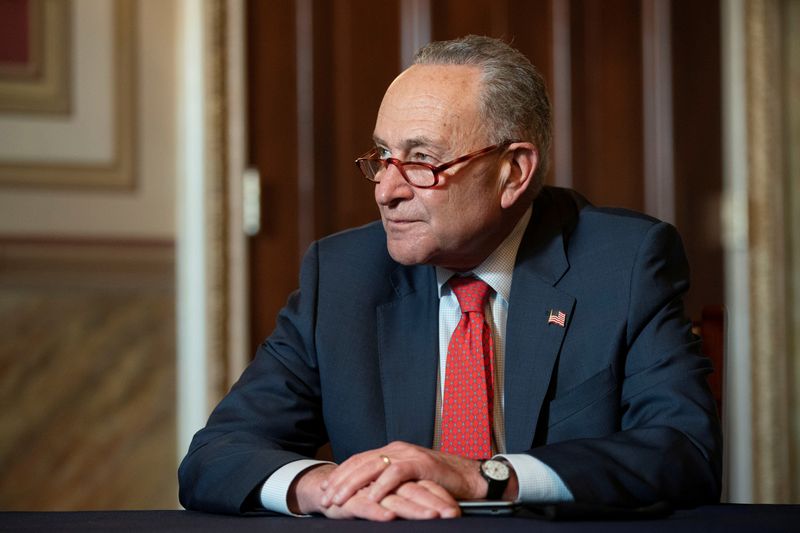WASHINGTON (Reuters) - Democrats in the U.S. Senate will move forward on U.S. President Joe Biden's coronavirus relief plan without Republican support if necessary, Senate Democratic leader Chuck Schumer said on Tuesday.
Biden has made addressing the COVID-19 pandemic, which has killed over 420,000 people in the United States and has left millions out of work, a major focus of his first week in office.
Biden is calling on Congress to approve $1.9 trillion in spending, on top of the roughly $4 trillion authorized over the past year to address the heavy human and economic toll.
"We want to work with our Republican colleagues to advance this legislation in a bipartisan way," Schumer said on the Senate floor. "But the work must move forward, preferably with our Republican colleagues, but without them if we must."
In the House of Representatives, members of the bipartisan 'Problem Solvers' caucus who played an important role in the last COVID-19 aid bill urged the Democratic White House to develop a COVID-19 aid package together with Republicans.
"As we discussed today, our Caucus is committed to working with our Senate colleagues to find a bipartisan path forward on the next COVID-19 relief package," the co-chairs of the caucus, Republican Tom Reed and Democrat Josh Gottheimer, said in a statement after a phone call with the top White House economic adviser, Brian Deese.
The Senate is split 50-50 following November's election, but 60 votes are usually needed to pass legislation.
However, Schumer told reporters that an initial vote on passing coronavirus relief could take place next week through a process known as budget reconciliation, which only requires a simple majority vote.
Senate Republicans bemoaned that possibility.
"I think that would be not just a big mistake at this stage at the start of this administration, but irresponsible given what's happened with the COVID-19 package. We're willing to work with them and we said that on Sunday," Republican Senator Rob Portman told reporters.
Biden has called for unity and bipartisan support of his plan, but Republicans have balked at the high price tag and senators of both parties have said they want the package to be more targeted.
Meanwhile, congressional Democrats introduced on Tuesday a bill that would increase the minimum wage to $15 an hour, one of the components of Biden's coronavirus package - raising the possibility that lawmakers could take a more piecemeal approach to the legislation.

Congressional Republicans have traditionally opposed such measures. In 2019, only three Republicans voted for a similar minimum wage hike in the House. The federal minimum wage has not been changed since 2009, when it became $7.25 an hour.
